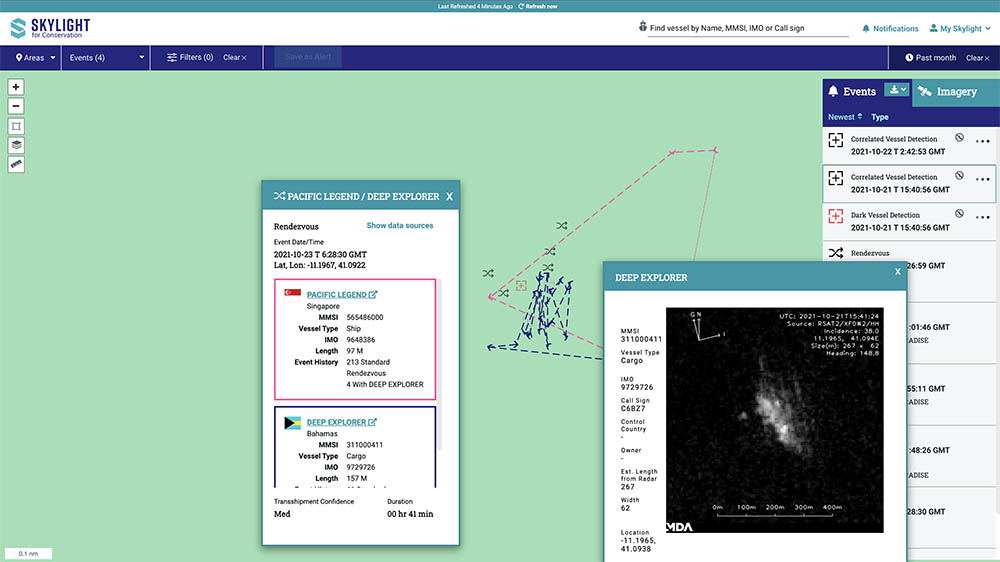Innovative Customer Spotlight – Skylight from the Allen Institute for AI (AI2)
Our customers constantly amaze us with their innovative approach to industry solutions and out-of-the-box ideas to build a better planet. This month’s Innovative Customer Spotlight is on Skylight, a real-time maritime transparency tool from the Allen Institute for AI (AI2). Learn how Skylight is helping to identify illegal fishing activities that threaten fish populations and ocean ecosystems around the world.
In 2016, there were an estimated 4.6 million fishing vessels in operation around the globe. The fishing industry has contended with mounting news about diminishing ocean ecosystems and declining fish populations suffering from the devastating effects of climate change, pollution, and overfishing. Rules and regulations, in the form of fishing moratoriums and catch limits, were put into effect years ago in an effort to preserve and restore many of the ocean’s delicate ecosystems. Yet, enforcing these limits and ensuring moratoriums are being followed is challenging and complicated. How can you identify Illegal, unreported, and unregulated (IUU) fishing operations? IUU is a global issue that has serious economic, human rights, and food security implications. The need for a real-time maritime tracking and transparency tool was critical and Skylight answered the call.
Focus on positioning and maneuvers
Skylight tracking gives users the opportunity to set up alerts for their area of interest. These alerts and the tracking system document vessel activities over time including “Dark Rendezvous” events. These are where two vessels have met on the open ocean, but only one is publicly transmitting its information through the Automatic Identification System (AIS.) It’s a sign of potential transshipping at sea and while most cases are legal, this practice can hide IUU fishing practices and mask human rights abuses. Skylight’s advanced machine learning algorithm helps uncover finite details about ship positioning that can shed light on the potential activities taking place.
Rendezvous events in Skylight show two vessels that may have completed a transshipment. Here, we can see the vessel tracks and information about each vessel. Skylight also includes “Dark Rendezvous” events where AI machine learning detects suspicious maneuvering by one AIS transmitting vessel that could be meeting with a “dark” or non-AIS transmitting vessel.
Skylight’s algorithm detects loitering and changes in maneuvering that can be indicative of a vessel on AIS transshipping with a vessel not on AIS. These are known as Dark Rendezvous events. While a Dark Rendezvous does not necessarily mean a transshipment happened, the longer such an event lasts, the more likely there was enough time for one vessel to transship fish to another one.

Rendezvous events in Skylight, as shown in the screenshot, indicate a possible transshipment between two AIS transmitting vessels. In this case, Skylight shows a correlated vessel between AIS signal and a Satellite image (SAR) of the vessel “Deep Explorer.”
Information helps to select vessels for inspection
This information lets users know that ships involved in this activity should be selected for port inspection so authorities can check that fishing vessels aren’t under-reporting the amount of fish on board. Fishing vessels guilty of under reporting suffer financial fines.
According to the UN Food and Agriculture Organization (FAO), IUU fishing is responsible each year for the loss of 11-26 million tonnes of fish worth an estimated $10-23 billion. In Africa alone, one in four fish may be caught illegally, threatening the sustainability of fish stocks and pushing the health of our oceans to the brink.
Real-world impact
AI2 is a non-profit research institute founded in 2014 with the mission of conducting high-impact AI research and engineering in service of the common good. AI2 is the creation of Paul G. Allen, the late Microsoft co-founder, and is led by Dr. Oren Etzioni, a leading AI researcher.
Partners can see real-time “Entry” events by vessels transmitting AIS in custom Areas of Interest. Partners can also configure “Speed Range” events by distance or duration for monitoring speed regulations or other speed-related behavior (e.g. fishing).
Headquartered in Seattle, Skylight is AI2’s contribution to ocean health and there is no cost to end users. Used by partners such as WildAid and the United Nations on Drugs and Global Maritime Crime Programme as well as countries across the globe, Skylight’s technology is giving countries most threatened by illegal fishing activities the resources they need to combat IUU through enforcement, deterrence, and transparency.